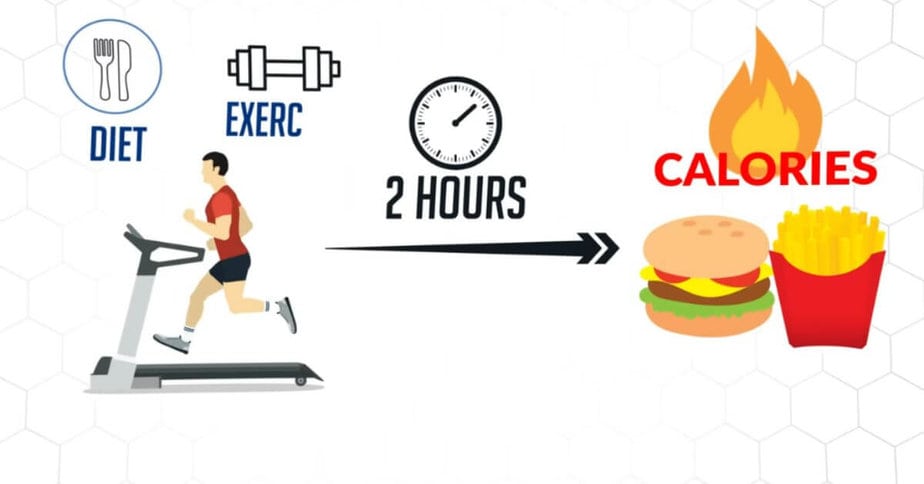If I Burn 1000 Calories a Day And Eat 1500: Maximize Weight Loss with These Power Tips
Last Updated on October 22, 2023 by Justin Harris
If I Burn 1000 Calories a Day And Eat 1500, you have a deficit of 500 calories. This can lead to weight loss over time.
Achieving weight loss goals requires a combination of physical activity and a proper diet. Many individuals wonder about the outcome of burning 1000 calories a day and consuming 1500 calories. These numbers indicate a deficit of 500 calories, which can contribute to weight loss.

However, it is important to keep in mind that weight loss is a complex process influenced by various factors such as metabolism, body composition, and overall health. We will delve deeper into the impact of burning 1000 calories while consuming 1500 calories and discuss how it may contribute to your weight loss journey.
Read Also, Are Spaghettios Good for Weight Loss
Assessing Your Daily Calorie Intake
If you are looking to assess your daily calorie intake, it’s important to start by determining your basal metabolic rate (BMR). Your BMR is the number of calories your body needs to function at rest. It is influenced by factors such as your age, sex, height, and weight. To calculate your BMR, you can use the Harris-Benedict equation:
For men: BMR = 88.362 + (13.397 × weight in kg) + (4.799 × height in cm) – (5.677 × age in years)
For women: BMR = 447.593 + (9.247 × weight in kg) + (3.098 × height in cm) – (4.330 × age in years)
Once you have determined your BMR, you can calculate your Total Daily Energy Expenditure (TDEE). Your TDEE takes into account your activity level and provides an estimate of the total number of calories you burn in a day. To calculate your TDEE, simply multiply your BMR by an activity factor that corresponds to your activity level:
| Activity Level: | Activity Factor: |
|---|---|
| Sedentary (little to no exercise) | 1.2 |
| Lightly active (light exercise/sports 1-3 days/week) | 1.375 |
| Moderately active (moderate exercise/sports 3-5 days/week) | 1.55 |
| Very active (hard exercise/sports 6-7 days a week) | 1.725 |
| Extra active (very hard exercise/sports and a physical job) | 1.9 |
By calculating your TDEE, you can get a better understanding of how many calories you need to consume to maintain your current weight or reach your weight loss goals.
Recommended: Best Sauna Suit for Weight Loss
Keep in mind that a deficit of 500-1000 calories per day can lead to a weight loss of about 1-2 pounds per week. However, it’s important to consult with a healthcare professional or registered dietitian before making any drastic changes to your calorie intake or exercise routine.
The Importance Of A Calorie Deficit
In order to lose weight, it is important to create a calorie deficit. A calorie deficit occurs when you burn more calories than you consume. This creates an energy imbalance in the body, leading to weight loss.
When you burn 1000 calories a day through physical activity and consume only 1500 calories, you create a calorie deficit of 500 calories. This deficit forces your body to use stored fat as a source of energy, resulting in weight loss over time.
A calorie deficit plays a crucial role in weight loss because it forces the body to tap into its fat stores for fuel. It is important to note that a healthy and sustainable rate of weight loss is around 1-2 pounds per week. This can be achieved by creating a moderate calorie deficit of 500-1000 calories per day.
Effective Workout Routines For Calorie Burning
Read Also, Are Stationary Bikes Good Cardio?
Effective workout routines can help maximize calorie burning and support weight loss efforts. Incorporating various exercises into your fitness regimen is key to achieving this goal. Here are some options to consider:
High-intensity Interval Training (hiit)
HIIT workouts involve alternating between short bursts of intense exercise and brief recovery periods. This type of training has been shown to be highly effective in burning calories. Examples of HIIT exercises include sprints, burpees, and cycling intervals. Keep in mind to warm up properly before engaging in high-intensity exercises to prevent injury.
Cardio Exercises For Maximum Calorie Burn
Engaging in cardiovascular exercises not only helps improve heart health but also burns a significant amount of calories. Running, swimming, cycling, and jumping rope are excellent choices for calorie burning. Aim for at least 30 minutes of moderate-intensity cardio exercises most days of the week to achieve optimal calorie expenditure.
Strength Training And Its Impact On Calorie Expenditure
Strength training exercises are also crucial for burning calories and maintaining muscle mass. Incorporating exercises such as weightlifting and bodyweight exercises into your routine helps boost metabolism and increase calorie expenditure even at rest. Aim to include strength training exercises at least two to three times a week.
Incorporating Physical Activity Into Your Daily Routine
Incorporating physical activity into your daily routine can help you burn more calories and maintain a healthy weight. To increase your daily movement and non-exercise activity thermogenesis (NEAT), try implementing the following tips:
- Take the stairs instead of the elevator whenever possible
- Choose to walk or bike instead of driving for short distances
- Stand up and stretch at regular intervals if you have a sedentary job
- Engage in household chores such as cleaning, gardening, or mowing the lawn
- Participate in activities that you enjoy, such as dancing, hiking, or playing a sport
- Make it a habit to take regular breaks and go for a brisk walk
- Park your car farther away from your destination to get some extra steps in
By making exercise enjoyable and incorporating physical activity into your daily routine, you can sustain your motivation to stay active and burn more calories. Remember, even small changes can add up and make a significant difference in your overall health and fitness.
Balancing Macronutrients For Optimal Weight Loss
When you’re trying to achieve weight loss, it’s essential to balance your macronutrients properly. Macronutrients refer to carbohydrates, proteins, and fats, which are the three main nutrients your body needs in large amounts. Each macronutrient plays a vital role in your overall health and weight loss journey.
Carbohydrates are your body’s main source of energy. Including complex carbohydrates like whole grains, fruits, and vegetables in your diet can help fuel your workouts and provide essential vitamins and minerals. Proteins are crucial for building and repairing tissues and promoting muscle growth.
Read Also, Do Stationary Bikes Build Muscle
Lean sources of protein like poultry, fish, tofu, and legumes should be incorporated into your meals. Fats are necessary for various bodily functions and help you feel satisfied after a meal. Opt for healthy fats like avocados, nuts, and olive oil.
The right macronutrient ratio for weight loss depends on various factors such as your activity level, body composition, and individual preferences. In general, a balanced approach is recommended, with a focus on portion control and mindful eating. Consulting a registered dietitian or nutritionist can provide personalized guidance based on your specific needs and goals.
Choosing Nutrient-dense Foods
If you are burning 1000 calories a day through exercise and consuming 1500 calories, it is important to choose nutrient-dense foods to support your body’s needs. Nutrient-dense foods are whole foods that provide a high amount of vitamins, minerals, and other essential nutrients compared to their calorie content.
These foods can help you feel fuller for longer periods and maintain a healthy weight. Incorporating lean proteins, high-fiber carbohydrates, and healthy fats in your diet is essential for satiety and overall health.
Read Also, Why Does Weight Feel Heavier Some Days?
Lean proteins such as chicken, turkey, fish, tofu, and Greek yogurt can help build and repair muscles while keeping you satisfied. High-fiber carbohydrates like whole grains, legumes, fruits, and vegetables provide sustained energy and promote digestive health. Adding healthy fats from sources like avocados, nuts, seeds, and olive oil can help you feel satisfied and provide important nutrients.
Mindful Eating And Portion Control
The importance of portion control and mindful meal planning cannot be overstated when it comes to maintaining a healthy lifestyle. Mindful eating is a technique that can help individuals avoid overconsumption and make wise food choices.
By being present and aware of the eating experience, one can develop a better understanding of hunger and fullness cues, which can prevent mindless snacking and excessive calorie intake. It’s essential to focus on the quality of the food consumed, prioritizing nutrient-dense options over empty calories.
Additionally, practicing portion control is vital, as it allows for the enjoyment of a variety of foods while still maintaining a calorie deficit, which is necessary for weight loss. By taking the time to savor each bite, chewing thoroughly, and appreciating the flavors and texture of the food, one can derive greater satisfaction from smaller portions.
When it comes to eating mindfully, techniques such as using smaller plates, slowing down the pace of eating, and eliminating distractions can be helpful strategies for avoiding overeating and making healthier food choices.
Incorporating Intermittent Fasting
If you are looking to burn 1000 calories a day and eat 1500, incorporating intermittent fasting can be a beneficial strategy. Intermittent fasting is a pattern of eating and fasting cycles which can support weight loss when combined with a calorie deficit. There are different fasting methods, each with its own benefits.
Fasting Methods and Their Benefits
| Fasting Method: | Benefits: |
|---|---|
| 16/8 Method | Helps control insulin levels, promotes fat burning, and increases growth hormone secretion. |
| 5:2 Method | Assists in reducing calorie intake, improving metabolic health, and reducing inflammation. |
| Alternate-Day Fasting | May lead to significant weight loss, reduce markers of inflammation, and improve heart health. |
| OMAD (One Meal a Day) | Facilitates calorie restriction, supports weight loss, and may improve mental clarity. |
Incorporating intermittent fasting into your routine can help create a calorie deficit and promote weight loss. It is important to consult with a healthcare professional or registered dietitian to determine the most suitable fasting method for your goals and overall health.
Remember to track your calorie intake and choose nutrient-dense foods to ensure you are obtaining a balanced diet despite the calorie restriction.
Quality Sleep For Weight Management
To support weight management goals, it is important to prioritize quality sleep as it can have a significant impact on metabolism. Research suggests that insufficient sleep can disrupt the balance of hormones that regulate appetite, leading to increased cravings and overeating.
Moreover, lack of sleep can also slow down the metabolism, making it more difficult to burn calories efficiently. To improve sleep quality, consider the following tips:
- Establish a consistent sleep schedule: Go to bed and wake up at the same time every day, even on weekends.
- Create a relaxing nighttime routine: Engage in soothing activities such as reading, listening to calming music, or taking a warm bath before bed.
- Create a sleep-friendly environment: Make sure your bedroom is cool, quiet, and dark to promote restful sleep.
- Avoid stimulating substances: Limit caffeine and alcohol intake, especially close to bedtime, as they can disrupt sleep patterns.
- Exercise regularly: Regular physical activity can improve sleep quality, but avoid exercising too close to bedtime as it may interfere with falling asleep.
By prioritizing quality sleep and implementing these tips, you can support your weight management goals and improve overall well-being.
Stress Management And Its Impact On Weight Loss
Stress management plays a crucial role in weight loss. Chronic stress can have a significant impact on weight gain. When under stress, the body releases cortisol, a hormone that can stimulate appetite and lead to overeating, particularly high-calorie and sugary foods. It can also affect metabolism and promote fat storage, especially in the abdominal area.
To optimize weight loss, it is essential to recognize the effect of chronic stress and implement strategies to manage it effectively. First and foremost, regular exercise can help reduce stress and improve mood by releasing endorphins, the body’s natural feel-good chemicals. Prioritizing self-care and relaxation through activities like yoga, meditation, or deep breathing exercises is also beneficial.
Other strategies for stress management include making time for hobbies and enjoyable activities, getting enough quality sleep, and seeking support from friends, family, or professionals. Healthy diet choices can also assist in managing stress and achieving weight loss goals. Opting for whole, nutrient-dense foods can support overall well-being and help combat the negative effects of stress.
Importance Of Tracking Daily Calorie Intake And Expenditure
Tracking your daily calorie intake and expenditure is crucial when it comes to maintaining a balanced and healthy lifestyle. By monitoring the calories you consume and the calories you burn, you can better understand how your body responds to different activities and adjust your diet accordingly to achieve your desired goals.
One effective way to track your calorie intake and expenditure is by utilizing the numerous mobile apps and tools available today. These apps allow you to log your meals, including portion sizes and nutritional information, making it easier to stay accountable and make informed food choices. They also provide activity trackers, allowing you to monitor your workouts and estimate the calories burned.
To maintain consistency in tracking your progress, consider setting specific goals and creating a routine. Make tracking a part of your daily routine, and allocate time for logging your meals and exercises. Additionally, find a tracking method that works best for you, whether it’s through an app, a journal, or a spreadsheet.
Remember, accurate tracking is key to understanding your calorie balance and making adjustments if necessary. Stay consistent, stay accountable, and reap the benefits of a healthier lifestyle.
Finding Motivation And Accountability
Regularly burning 1000 calories a day while consuming 1500 can result in a calorie deficit, leading to weight loss. To maintain motivation and accountability, it’s important to create a support system.
This may include finding a workout buddy or joining a fitness group to encourage and hold each other accountable. Celebrating non-scale victories, such as increased stamina or fitting into smaller clothes, can also sustain motivation. Remember to track progress using a fitness app or journal, and regularly set achievable goals to stay motivated.
Seeking guidance from a registered dietitian can help create a balanced meal plan that supports weight loss while providing necessary nutrients. In summary, finding motivation and accountability through a support system and celebrating non-scale victories can help sustain a healthy lifestyle and achieve weight loss goals.
Conclusion
To summarize, consistently burning 1000 calories a day and consuming 1500 calories may create a calorie deficit that can aid in weight loss. However, it is crucial to consider individual factors such as metabolism, activity levels, and overall health. It’s always recommended to consult healthcare professionals or qualified nutritionists for personalized advice.
Remember, maintaining a healthy lifestyle is a holistic approach that involves a balanced diet, regular exercise, and mindful choices.
Read Also,
- Why Does Creatine Taste So Bad?
- Why Does Creatine Make Me Nauseous
- Why Does Creatine Powder Jump?
- Why Do Squats Make My Heart Race?
- Why Do the Weights Feel Heavier Today
- If I Eat 2000 Calories And Burn 500
- Why Does Pre Workout Make Me Sleepy?
- Why Do Some Cable Machines Feel Heavier?
- Why Do My Shoulders Pop When I Do Lateral Raises?
- Why Do My Muscles Look Smaller After Working Out






